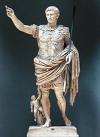http://www.examiner.com/x-373-SF-Classical...Pride-Week-2009

Scott Foglesong Go to Scott's Home Page
SF Classical Music Examiner
There have been a lot of composers writing a lot of music over the years, and it's pretty safe to assume that not all of them have been exclusively heterosexual. In honor of the current Gay Pride Week here in San Francisco, I offer a brief look at composers and their gender preferences.
Note: this is an updated version of an article from last year.
On the surface it would appear that gay composers have proliferated dramatically during the 20th century. That has little to do with actual gender preference per se, and a lot to do with public attitudes towards homosexuality. For the most part, composers in earlier eras couldn't be 'out' in the modern sense — well, not if they wanted to work, and in some cases, not if they wanted to retain their freedom. So they kept mum.
Consider Renaissance composer Nicolas Gombert: quite likely gay, but the evidence pointing in that direction is, alas, that he was busted for pederasty. Such is the nature of things when only criminal records survive.
But in the 20th century, composers could start letting it speak its name. Thus Leonard Bernstein (bisexual at least, although openly gay after his divorce), Aaron Copland, Samuel Barber, Gian-Carlo Menotti, Virgil Thomson, David Diamond, Lou Harrison, Henry Cowell, Hans Werner Henze, John Cage, Benjamin Britten, Michael Tippet, Marc Blitzstein, John Corigliano, Harry Partch, Ned Rorem, Michael Tippet, Francis Poulenc, Libby Larsen, Conrad Susa, David Conte, and Thomas Adès among others. Some of these are very big-time, household-name composers indeed (Copland and Britten) whereas other ones aren't quite as well known to the general public.
Check out Wikipedia's list of LGBT composers.
I should mention that the situation wasn't quite as lopsided as the above list might make it seem: major twentieth century figures such as Elliot Carter, Charles Ives, Roger Sessions, George Gershwin, Arnold Schoenberg, Alban Berg, Anton Webern, and Igor Stravinsky were/are all heterosexual. (One hears some rumors about Gershwin, and sometimes Stravinsky.) Pierre Boulez's gender orientation remains a matter for speculation.
Move back into previous centuries, and the known list of gay composers thins out dramatically. Peter Ilyich Tchaikovsky is one of the few A-list composers who was definitely, unquestionably gay, in the same sense that Johann Sebastian Bach, with his 20-plus children and two happy marriages, was definitely, unquestionably heterosexual. But Tchaikovsky is a rarity in that regard.
Something I find intriguing are those A-list composers of the past who were possibly gay, at least based on whatever evidence has managed to survive.
.jpg) George Frideric Handel is a strong candidate, at least as a closet case. He never married; only rumors survive of a mysterious relationship with a woman very early in his career, and then nothing more. His sexuality was a popular gossip item during his own lifetime, in fact. There is a story (probably apocryphal) that King George II, suspicious of Handel's bachelor status, asked him bluntly whether or not he liked women; Handel is supposed to have said he had no time for anything except his music. Ellen T. Harris's book "Handel as Orpheus" goes into the issue in some detail, as well as the relation of creativity to sexuality.
George Frideric Handel is a strong candidate, at least as a closet case. He never married; only rumors survive of a mysterious relationship with a woman very early in his career, and then nothing more. His sexuality was a popular gossip item during his own lifetime, in fact. There is a story (probably apocryphal) that King George II, suspicious of Handel's bachelor status, asked him bluntly whether or not he liked women; Handel is supposed to have said he had no time for anything except his music. Ellen T. Harris's book "Handel as Orpheus" goes into the issue in some detail, as well as the relation of creativity to sexuality.Franz Schubert's gender preference has been a hot topic of discussion since Maynard Solomon's 1989 article "Franz Schubert and the Peacocks of Benvenuto Cellini." Solomon took a good look at Schubert's (short) life, and deduced that there was a likelihood that Schubert was sexually active (carelessly so, it would appear) within a gay subculture in early 19th-century Vienna. The evidence is only circumstantial, but Solomon definitely put forward a compelling argument.
.jpg) As a result, before too long common wisdom had it that Schubert was gay, a state of affairs which musicologist Rita Steblin found unacceptable. Her rebuttal to Solomon's article set off a chain reaction of disputation and argument, even to the point of the subject's virtually hijacking a session of the American Musicological Society. The jury is still out, and may never render a final verdict.
As a result, before too long common wisdom had it that Schubert was gay, a state of affairs which musicologist Rita Steblin found unacceptable. Her rebuttal to Solomon's article set off a chain reaction of disputation and argument, even to the point of the subject's virtually hijacking a session of the American Musicological Society. The jury is still out, and may never render a final verdict.Perhaps a larger question to ask is: does it matter? Personally I don't think so. Sometimes commentators look for "gay" aspects within a composer's work — but that seems dreadfully one-sided. (Why not look for "heterosexual" elements in, say, Mozart?) If we're interested in the details of a composer's life, then certainly gender preference is part of that interest. But as gender preference having influence over the actual music a composer creates — even if that music sets a gay-themed text — I remain highly skeptical.
___________________________________________________
I should jump in here and point out that most of the 20th century composers who make my ears hurt are in the heterosexual category.
I put this here because I don't necessarily expect the possible discussion on it to remain serious or on-topic.
Also, that incident in the American Musicological Society can be seen as contemporary with the rift in the Southern Baptist Convention over the issue of Biblical literalism, if not as huge (this was in America's cocaine, hair band, and Reagan-Bush Sr. days).

 Help
Help
 This topic is locked
This topic is locked





















